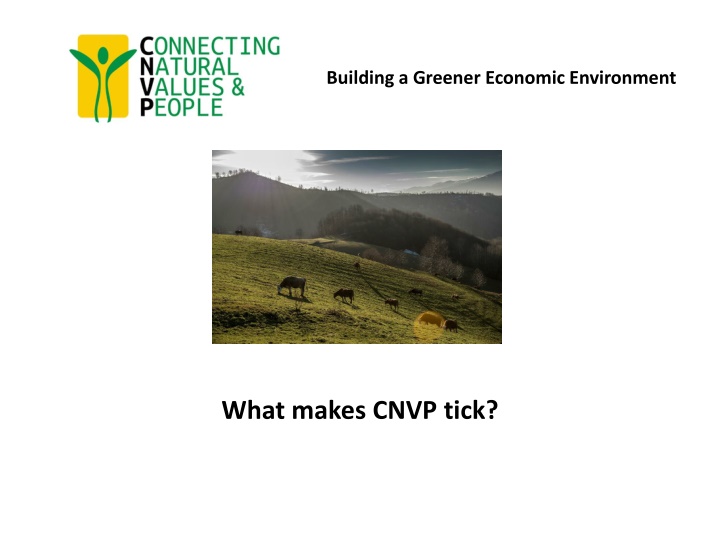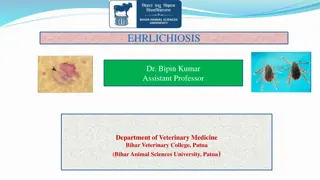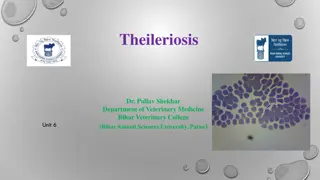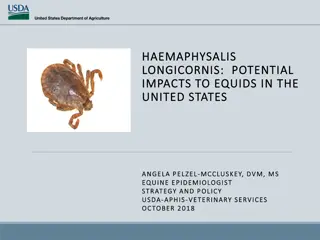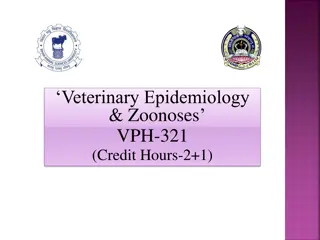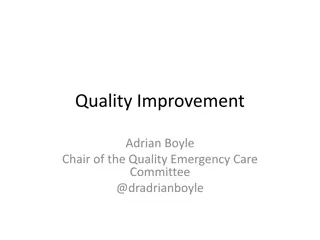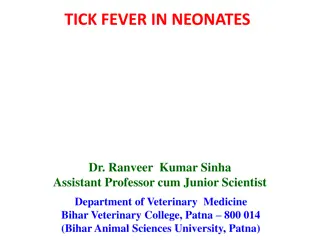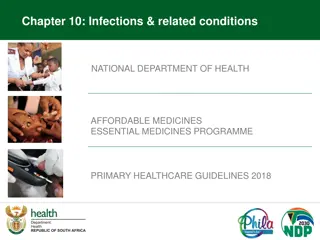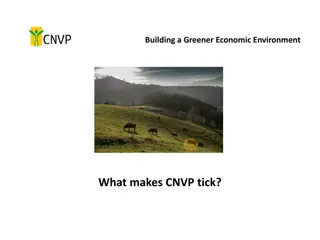CNVP: Building Sustainable Agri-Rural and Forestry Development
CNVP focuses on achieving sustainable agri-rural and forestry development through activities related to the Green Economy and the Brown Agenda in the Balkans region. It collaborates with stakeholders from various sectors, applies a team-based approach, and aims to enhance the technical capacity of partners. The organization's mission is to use evidence-based analysis to improve the livelihoods of rural communities amidst environmental and climate change challenges. CNVP's key areas of capacity strengthening include sustainable forest management, climate change, agri-rural development, renewable energy, waste management, community mobilization, and European accession issues.
Download Presentation

Please find below an Image/Link to download the presentation.
The content on the website is provided AS IS for your information and personal use only. It may not be sold, licensed, or shared on other websites without obtaining consent from the author.If you encounter any issues during the download, it is possible that the publisher has removed the file from their server.
You are allowed to download the files provided on this website for personal or commercial use, subject to the condition that they are used lawfully. All files are the property of their respective owners.
The content on the website is provided AS IS for your information and personal use only. It may not be sold, licensed, or shared on other websites without obtaining consent from the author.
E N D
Presentation Transcript
Building a Greener Economic Environment What makes CNVP tick?
Key points about CNVP: Focuses on achieving sustainable agri-rural and forestry development through implementation of activities related to the Green Economy and the Brown Agenda. Operates in the Balkans (Macedonia, Kosovo, Albania, Montenegro, Serbia and Bosnia Herzegovina), with a view to working in Turkey, the European Neighbourhood Space and the MENA area. Works with stakeholders and partners in the public, private and civil society sectors at central and decentralised levels. Applies a team-based approach that incorporates innovative ideas into decision-making processes to achieve targeted results.
Key skills: As a civil society organisation, CNVP has built an international reputation as a facilitator. Its 28 employees use tried and tested analytical, consulting, advisory, coaching, mentoring, demonstration and knowledge transfer skills to achieve long-term sustainability of development activities. CNVP helps partners to strengthen their technical capacity through the implementation of in-country, cross-border and regional cooperation projects.
Mission: To use evidence-based analysis with which to improve the sustainable livelihoods of rural communities within the ongoing process of environmental and climate change.
Six key areas of CNVP capacity strengthening: 1. Sustainable forest management 2. Climate change, environment and NRM 3. Agri-rural development 4. Renewable energy and waste management 5. Community mobilisation 6. European accession issues and related policy questions
1. Sustainable forest management Multi-functional systems for farmer-focused forestry (small-scale, private or communal) to develop forest production, utilization and monitoring Forest governance and legislative reform, including evidence-based forest policy, decentralized forest management and joint forest management Forest certification capacity building to improve forest governance, strategic planning and decision-making Development of timber/non-timber forest product value chains through the improved organization of producers/collectors Agro-forestry, inter-cropping, permaculture and silvi-culture, as well as forestry and orchard establishment/management Innovative forest practices and use of appropriate technology, including GIS and GPS surveys, as well as drones Reform the legal and institutional frameworks for the forest sector Civil society monitoring to improve forest protection, overcome illegal logging, reduce corruption and enhance government accountability National timber tracking and revenue collection systems, and satellite monitoring of forests to improve law enforcement Build SME forest enterprises capacity to help them comply with laws and regulations of the formal sector
2. Climate change, environment and NRM Climate change mitigation measures and environmental impact assessments (EIAs) Disaster risk reduction (illegal logging and sand/gravel extraction, as well as soil erosion and excess flooding), and national/local food security Sustainable natural resource management (NRM), including forest inventories, as well as the efficient use and conservation of water, including transboundary pollution Support for green infrastructure, nature conservation, bio-diversity and eco-system restoration, including national parks and other protected areas Land use, tenure and consolidation, including watershed management Improved land management and consolidation, including securing property rights through the use of participatory mapping
3. Agri-rural development Job creation, income generation and improved rural livelihoods through better market access Support for all activities along agri-rural and forestry value chains production, processing, storage, transport and sale to domestic and export markets Certification of organic agriculture Support for high value-added agriculture, eco-tourism and rural diversification Promotion of area-based development, including mountain areas
4. Renewable energy and waste management Replacement of fossil fuels with renewable energy, particularly wood biomass, short rotation crops and bio-energy production Monitoring opportunities for other forms of renewable energy in rural areas e.g. geo-thermal, solar, wind, mini-hydro and tidal Increased use of carbon sequestration, energy audits and carbon credits Management of household and industrial waste
5. Community mobilisation Empowerment of rural women - building ownership and trust Development of private and communal forest and pasture owner/user associations Strengthening organisations and supporting institutional development, including multi- stakeholder processes, advocacy and lobbying Promotion of democratic governance Development of local action groups (LAGs) based on LEADER principles
6. European accession issues and related policy questions Application of EU standards in agri-rural and forestry development Approximation of national legislation within the EU accession context Use of policy simulations, particularly related to Chapter 11 (Agriculture) and Chapter 27 (Environment) of the acquis communautaire Development of evidence-based Green Economics , budget support for the environment sector, and green financing Implementation of measures in Agriculture and Rural Development Programmes for 2014-20 funded through IPARD II and the European Neighbourhood Instrument
Key stakeholders Central and decentralised/local governments Private sector, including forest and pasture owner/user associations Forest and environmental protection agencies Producers organisations and women s groups Agriculture and forestry cooperatives Local communities, NGOs, CSOs and LAGs Universities and research institutions International organisations, including multilateral and bilateral development partners
Works with municipalities to improve: 1. evidence-based strategic sector reviews, annual and medium term budget analysis, and identification of alternative sources of funding 2. land registration and land consolidation 3. fast growing forest plantations, and use of wood bio-mass for public buildings 4. nature conservation, including protection against soil erosion and fire prevention on forested lands, as well as support for national parks, protected areas and other area- based conservation measures at local level 5. transboundary (water/air) pollution, including rehabilitation of damaged land 6. waste management (household/industrial), as well as production of energy from waste and sewage 7. rural infrastructure, including improved water supply (for better community health) 8. technical, social and physical management skills of municipality staff 9. consultancy and incubator support for the promotion of SMEs 10. service delivery for development of mountain area rural/eco-tourism service delivery, based on cluster policy 11. awareness of municipality staff, local civil society and schoolchildren concerning environment/climate change
Also, works with the private sector to: Create public-private partnerships Promote social entrepreneurship Apply corporate social responsibility
Supports international movements, particularly: 17 Sustainable Development Goals COP21 (Paris, December 2015) Cork Declaration #2 (Cork, September 2016) COP22 (Marrakech, November 2016) UN Convention to Combat Desertification
17 Sustainable Development Goals, (Paris, September 2015) Including the availability and sustainable management of water/sanitation (#6), access to affordable, reliable and modern renewable energy sources (#7), and climate change mitigation (#13), and particularly #15 which aims to: Protect, restore and promote sustainable use of terrestrial eco- systems Combat desertification Halt and reverse land degradation Prevent bio-diversity loss
COP21 (Paris, December 2015) 195 countries adopted the first-ever universal, legally binding global climate deal that sets out a global action plan to put the world on track to avoid dangerous climate change. A bridge between today's policies and achieving climate-neutrality before the end of the century, a key element is mitigation i.e. to reduce emissions by aiming to: keep the increase in global average temperature in the long term to well below 2 C above pre-industrial levels; limit the increase to 1.5 C, (in order to reduce risks and the impacts of climate change significantly); recognise the need for global emissions to peak as soon as possible, (taking longer for developing countries); and undertake rapid reductions thereafter in accordance with best available science.
Cork Declaration #2 (Cork, September 2016) 1. 2. 3. 4. 5. 6. 7. 8. 9. 10. Improving performance and accountability Promoting rural prosperity Strengthening rural value chains Investing in rural viability and vitality Preserving the rural environment Managing natural resources Encouraging climate action Boosting knowledge and innovation Enhancing rural governance Advancing policy delivery and simplification
COP22 (Marrakech, November 2016) Endorsing the Partnership for Global Climate Action, 2017-20; Raising ambition and strengthening cooperation to close the gap between current emissions trajectories and the pathway needed to meet the long-term temperature goals of COP21; Strengthening efforts to eradicate poverty, ensure food security and take stringent action to deal with climate change challenges in agriculture; Working on water scarcity, water cleanliness and water- related sustainability; Increasing the volume, flow and access to finance for climate projects, alongside improved capacity and technology; Endorsing the principle of a larger, more effective/efficient public/private funding; and Reaffirming the $100 billion mobilization goal.
UN Convention to Combat Desertification (UNCCD) #12 (Ankara, October 2015) COP12 aimed to make the area of healthy and productive land stay stable starting in 2030. It adopted the Ankara initiative to: Establish indicators for land degradation neutrality Combat desertification Restore degraded land and soil Support implementation of SDGs
Finally, four core values: Green intervenes to build a greener economic environment within the ongoing process of climate change Clean promotes renewable energy and improved household/industrial waste management Seen operates in the Balkans (now), as well as the surrounding European Neighbourhood Space and MENA area (future) Lean improves continuously and systematically the efficiency of CNVP s service delivery
Thank you for your attention. Questions, please. Building a Greener Economic Environment info@cnvp-eu.org www.cnvp-eu.org
